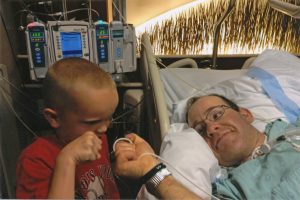In the prologue of my new book He Made Us Better: A Story of Faith, Family, Friends (and Football), I tell how our son Peter had incorporated legendary Notre Dame football coach Knute Rockne’s famous words, “When the going gets tough, the tough get going,” into the core of his being.
Peter was born with a serious birth defect, which led to a lifetime of physical challenges and medical complications. Scores of surgeries and lengthy hospitalizations were a way of life for Peter and his family. But despite these challenges, Peter nevertheless managed to beat the odds and amaze others by bouncing back for nearly forty years. And he remained joyful, positive, and productive in the process.
So how did Peter overcome all of this adversity? I’m not totally sure, but one thing I do know is that when Peter was born, his mom and I didn’t sit down and develop some grand, strategic plan for teaching Peter how to overcome adversity. However I do have some ideas that at least give a glimpse into what I think contributed to Peter’s remarkable ability to navigate his way through tough times. Here are a few of them:
— It starts with the parents. And no, I’m not going to break my arm patting ourselves on the back, because Sandra and I sure made our share of mistakes. But we did do some things pretty well, one of which is that neither of us are quitters. And we lived out that value in our daily lives. One of the ways that children learn best is from imitating what they see from the adults around them. Peter never saw us even thinking about throwing in the towel.
— A strong support system. We were blessed to have a tremendous network of support surrounding us—extended family, church family, school teachers, friends, and others— who, both directly and indirectly, sent the unmistakable message to Peter that “You’re important to us. You matter. We’re pulling for you. You can do this.”
— Sports. Even though Peter could never play them, he loved sports passionately, and followed them closely his entire life. Almost every individual or team that wins a championship will inevitably talk about “overcoming adversity” in the postgame interview. Sports really can teach us lessons about life, and with Peter, those lessons sunk in.
— Peter enjoyed life. In the book, I made the statement that “Peter was enjoying life too much to die.” There is much evidence, anecdotal and documented, of people giving up and dying before their time. But for Peter, family, friends, sports, having fun, and a strong sense of purpose, gave him a bulldog determination to persevere.
— He expected positive outcomes. It’s been proven over and over that if you expect something good to happen, it’s more likely to occur. When Peter was in the hospital for months, with his life and future in the balance, he just expected that eventually things would work out. And they pretty much did.
— Peter didn’t feel sorry for himself. While he had much reason to, he saw that as a waste of time and energy that could be better spent on other things.
— Prayers and a plan. Over Peter’s lifetime, I have no idea how many prayers were offered up on his behalf, but I’m guessing it was in the tens of thousands. I have to believe that those prayers were heard and that it made a difference. I also believe that God had a plan for Peter, which included showing his works through him. Which is largely what He Made Us Better is all about.

Recent Posts
Recent Comments
- Deanna Unger on Easter Surprise
- Charla Schoeff on Thanks
- Linda Driesen on Thanks
- Connie davis on Please, Talk to Me About Peter
- Charla Schoeff on 8 Reasons Why Watching Football With Peter Was Cool!



